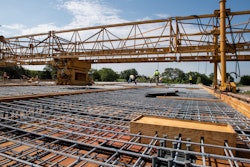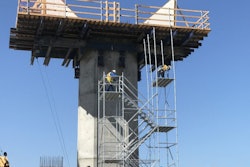Caltrans repaved its first section of state highway using all recycled material, including liquid plastic from disposable bottles.
The $3.2 million pilot project occurred on 1,000 feet of Highway 162 in Oroville. Lamon Construction Company of Yuba City was the prime contractor. The project used liquid plastic from 150,000 bottles in a mix to repave three lanes.
“The ‘plastic’ roadway has been found in previous tests to be more durable and last two to three times longer than traditional hot-mixed asphalt pavement,” Caltrans says.
The mix contained cold asphalt millings from the top 3 inches of pavement. The millings were mixed with a liquid plastic polymer binder from the bottles while in the paving train, according to Caltrans. The new material was placed on the top surface of the roadway and eliminated the need for trucks to bring in outside material.
The technology was developed by TechniSoil Industrial of Redding. The company says its G5 binder mixed with recycled-in-place asphalt requires 150,000 plastic bottles per lane mile. The company says the material lasts two to three times longer than traditional asphalt and has five times the tensile strength of asphalt. Other features, according to the company:
- Eliminates rutting and provides high reflective cracking resistance.
- Compression strength similar to concrete.
- Material can serve as a wearing course.
- 90 percent reduction in greenhouse materials.
After the material is placed and compacted with a vibratory roller, traffic can return within hours, the company says.
“By eliminating the need to haul asphalt from the outside, this process can significantly cut greenhouse gas emissions,” Caltrans says.
“This process is better for the environment because it keeps plastic bottles out of landfills and helps reduce greenhouse gas emissions and reliance on fossil fuels,” adds Caltrans District 3 Director Amarjeet S. Benipal.
“Using waste plastic that was otherwise destined for a landfill will not only reduce the cost of road repair and construction, but also increase the strength and durability of our roads,” says state Senator Ben Hueso.
The National Asphalt Pavement Association has successfully lobbied to have $800,000 included in a federal appropriations bill to study the use of recycled plastic in asphalt, according to the California Asphalt Pavement Association.











